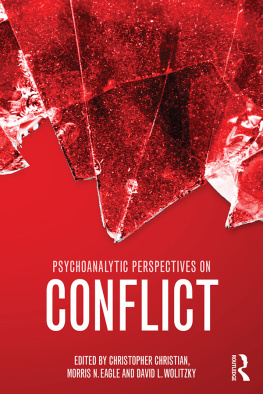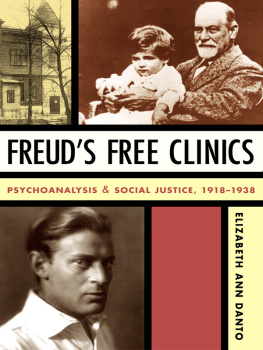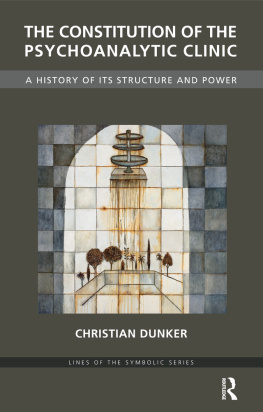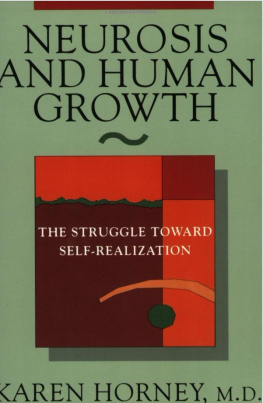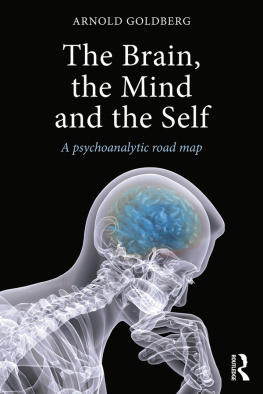Berlin Psychoanalytic
WEIMAR AND NOW: GERMAN CULTURAL CRITICISM
Edward Dimendberg, Martin Jay, and Anton Kaes, General Editors
Berlin Psychoanalytic
Psychoanalysis and Culture in Weimar
Republic Germany and Beyond
Veronika Fuechtner

University of California Press, one of the most distinguished university presses in the United States, enriches lives around the world by advancing scholarship in the humanities, social sciences, and natural sciences. Its activities are supported by the UC Press Foundation and by philanthropic contributions from individuals and institutions. For more information, visit www.ucpress.edu .
University of California Press
Berkeley and Los Angeles, California
University of California Press, Ltd.
London, England
2011 by The Regents of the University of California
Library of Congress Cataloging-in-Publication Data
Fuechtner, Veronika, 1969
Berlin Psychoanalytic : psychoanalysis and culture in Weimar Republic Germany and beyond / Veronika Fuechtner.
p. cm. (Weimar and now : German cultural criticism ; 43)
Includes bibliographical references and index.
ISBN 978-0-520-25837-2 (cloth : acid-free paper)
1. Psychoanalysis and cultureGermanyHistory20th century. 2. Berliner Psychoanalytisches InstitutHistory20th century. 3. Berliner Psychoanalytisches InstitutInfluence. 4. Psychoanalysis and culturePalestineHistory20th century. 5. Psychoanalysis and cultureNew York (State)New YorkHistory20th century. 6. PsychoanalystsGermanyBerlinBiography. 7. Authors, GermanGermanyBerlinBiography. 8. ArtistsGermanyBerlinBiography. 9. Berlin (Germany)Intellectual life20th century. 10. Modernism (Aesthetics)GermanyBerlinHistory20th century. I. Title.
BF175.4.C84F89 2011
150.19'5094315509041dc22 2011011198
Manufactured in the United States of America
20 19 18 17 16 15 14 13 12 11
10 9 8 7 6 5 4 3 2 1
This book is printed on Cascades Enviro 100, a 100% post consumer waste, recycled, de-inked fiber. FSC recycled certified and processed chlorine free. It is acid free, Ecologo certified, and manufactured by BioGas energy.
For Nikhil
Contents
Illustrations
Acknowledgments
The research for this book was made possible by grants from the SSRC, the NEH, the ACLS, the American Psychoanalytic Association, the Deutsche Schillergesellschaft, the University of Chicago, and Dartmouth College.
Eric Santner, Katie Trumpener, and Robert Pippin were wonderful mentors in the initial stages of this book, when it was still all about Dblin. They helped me see beyond. I would have never set out to write this book had it not been for Sander Gilman, who years ago got me interested in Karl Abrahams works, and whose generous support and intellectual vision were vital to the project throughout.
The members of the Berlin Forum for the History of Psychoanalysis were an important resource for mediscussions with them helped me shape the book at crucial junctures. I owe many thanks to Lilli Gast, Ulrike May, and Michael Schrter, but especially to Regine Lockot and Thomas Mller. The first forum member I met was Ludger Hermanns. He opened many doors for me, and I am deeply indebted to him for his continuous, amiable support and the many references he shared with me. Rainer Herrn and Ralf Dose from the Magnus-Hirschfeld-Gesellschaft helped me see my research on psychoanalysis as part of larger developments in scientific debates on sexuality. Several scholars of the Dblin society were important interlocutors in the initial stages, especially Anthony Riley. I am grateful to Bodo Kunke and Adam Zweig for talking to me about their family histories and giving life to some of my source material.
I thank the many archivists and librarians who gave me generous access to their sources, but especially Ute Doster, Sanford Gifford, Maren Horn, Jochen Meyer, Reinhart Sonnenburg, Nellie Thompson, and Miguel Valladares. The Staatsbibliothek Berlin kindly provided me with a writing booth.
I am lucky to be part of such a collegial, supportive, and intellectually stimulating department as the Dartmouth Department of German Studies. I am grateful to my colleagues and friends there and in the larger Dartmouth community. In particular, Colleen Boggs, Gerd Gemnden, Susannah Heschel, Irene Kacandes, Klaus Milich, Angela Rosenthal, Paula Sprague, Kate Thomas, and Melissa Zeiger gave support or feedback at crucial points. Bruce Duncan spent many hours gently editing my English and providing good-humored, no-nonsense commentary. The editing and bibliographic work of Shekhar Krishnan and of my former students Jessica Spradling and Bernadette Peters was invaluable to this project. Many thanks also to Tony Kaes, and the editors and staff at the University of California Press for their support along the way.
Discussions with Darcy Buerkle, Mara Heifetz, and Paul Lerner were crucial to the writing process. My anonymous tenure and manuscript readers took a lot of time and trouble to give me generous and detailed feedback, which was vital for the revisions. Among many others, Christina von Braun, Shailesh Kapadia, Nathan Kravis, George Makari, Mai Wegener, and Barbara Stimmel provided me with important opportunities to discuss my work with a larger audience and gain new insights in the process. Conversations with many other analysts and scholars shaped this project. In particular, the discussions at the German Film Institutes 2004 and 2006Unknown Weimarand at the Berlin Program for Advanced German and European Studies, 20042005, were pivotal to my thinking about this book within a wider framework. The Berlin Program coordinator, Karin Goihl, was of great help in many instances.
I also thank my dear friends who never got tired of hearing about this book. A special thank-you to Bo-Mi Choi, Ora Gelley, Ted Hardin, Anja Hellenbrecht, Andrew King, Philip Krippendorff, Annika Krump, Sascha Lehnartz, Vreni Naess, Cristina Nord, Manuel Rota, Daniela Siebert, Nora Stoppino, Eve Tselepatiotis, Joe Winston, and Sabra Zahn. Lisa Fittko (19092005) inspired me. My family, especially Jeh and Hans Fchtner; Valeria, Hendrik, and Bruno Knopp; Kamala and Raghunatha Rao; and Helma Mckelmann and Kurt Fchtner, supported and encouraged me over the years. This book is dedicated to Nikhil Rao, whose steady love, optimism, and patience carried me all the way.
Introduction
WHAT IS THE BERLIN PSYCHOANALYTIC?
This book recovers the vibrant cultural and intellectual history of the Berlin Psychoanalytic Institute (BPI) in the years between the end of World War I and the rise of the Third Reich and traces the BPIs worldwide impact on culture and psychoanalysis through its later development in 1940s Palestine and 1950s New York. It argues that Weimar Republic culture is inseparable from the psychoanalytic discourse on war neurosis, sexuality, and criminality specific to Berlin, and it connects paradigmatic movements, forms, and themes of Berlin modernism, such as Dada, multiperspectivity, and the urban experience, with the understanding of the psychoanalysis that was theorized and practiced at the Berlin Psychoanalytic Institute. In four case studies, I pair writers and psychoanalysts whose correspondence exemplifies the interplay between theoretical discussion and cultural production that is distinctive to the psychoanalytic culture and context of Weimar Berlin, including the narration of war trauma, conceptions of gender, the psychoanalytic theorization of race and anti-Semitism, and the various commingling interpretations of psychoanalysis as a philosophy, a political mission, and part of the cultural avant-garde. I also claim the Berlin Psychoanalytic to be a crucial historical and theoretical moment in the development of Frankfurt School theory and for the development of psychoanalytic thought beyond Freud.
Next page


